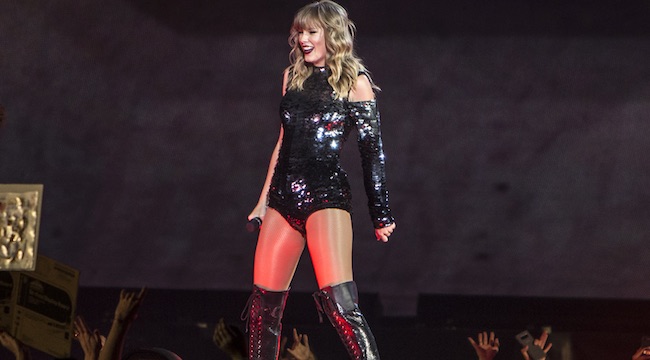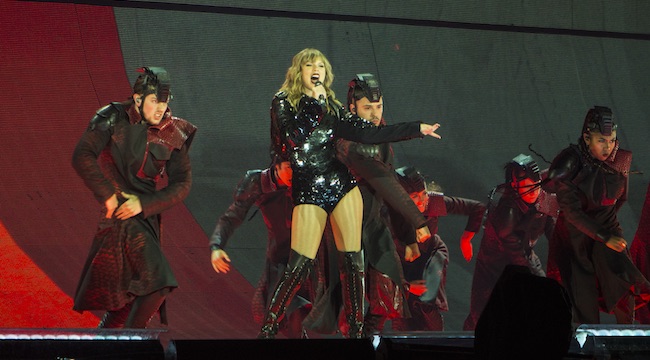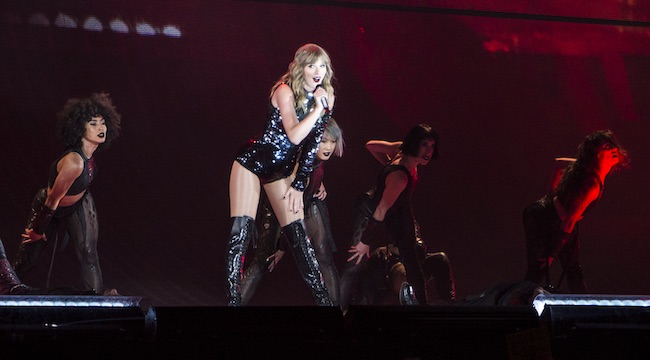
My reputation’s never been worse so, you must like me for me.
Loving Taylor Swift is easy. The girl next to me loves her, tells me about it without words in a language only we understand — a slanted, sweet glance of pain, that one lyric she sings forcefully, a little louder than she should — and that she’s there alone, too. But tonight, even solitary we’re not alone, none of us are, as there are another 60,000 people surrounding us and they all love her. When I look up, the entire stadium is glowing, twinkling with white light, then blue, then yellow via the soft, translucent gel LED wristbands we’re all wearing.
If this symbolic, clean band of light didn’t unite us, then a knowledge of the Swiftian canon would; only the rare men in our section maintained their composure as tracks off Reputation, Red, 1989 and beyond filled the University Of Phoenix Stadium on the opening night of Taylor Swift’s magnificent, no-holds-barred 2018 tour. The drought was the very worst, but Taylor is back in a big way — and nothing is off limits. It was time to address all the things she’d been running from, and who better to walk her through the first night publicly confronting her demons than a congregation of adoring fans?
Let the games begin.

I’ve loved Taylor Swift for exactly twelve years. I’m thirty now, so that’s the majority of my adult life. When she makes mistakes, I cringe along with her, remembering my similar missteps and recalling similar wounds. A year apart, both of us navigating very public fields for work, I sometimes analyze our strengths and weaknesses by drawing lines between our respective backgrounds: both raised in conservative, middle-class America, formative years spent idolizing the mythology of a Love Story arc, both writers, music-lovers, country music aficionados — both competitive as hell. I’m not the only fan to draw a parallel storyline with their favorite musician, but the public backlash Taylor faced from 2016 and beyond felt too resonant with my own experience to ignore, too.
Taylor Swift is my culture. Surely, I already knew that to some degree, but I never realized it more than when Reputation dropped late last fall. Unexpectedly in Norway that weekend, I was covering a small European music festival — or, I was supposed to be covering it. Friday morning, attendees kept attempting to communicate with me while I sat ensconced in puffy, pink Beats headphones I couldn’t bring myself to remove, wrapped up in the world of Reptuation.
Puzzled, strangers would eventually give up on the hope of a conversation and fade back into the crowd. Eventually, I too gave up on even pretending to be present and headed down toward the water to listen uninterrupted. After Taylor’s extended break from the spotlight, listening felt like spending time with a friend who’d gone missing and returned with stories to tell.
https://instagram.com/p/BbT8e3rFK5s/
Nursing myself through a particularly dark patch in my own life, I walked along the shore of this small coastal town, losing myself inside a new slice of Taylor’s universe. I listened to “End Game” while a minor gray tempest swirled around me, sheets of rain barely deflected by my cheap umbrella, watched clouds dance across the lake as “Delicate” coaxed tremulous, golden desire, and ducked into a side alley paved with cobblestones for my mini freakout over the key change in “Getaway Car.” I was an ocean away, drinking in the record like a potion, basking in the glow of her songwriting, a warmth I’ve returned to for solace, strength, and joy for over a decade.
Before that weekend, the kind of intense pain I’d use a record like Swift’s to numb was usually evoked by romantic fallout. This time, it was something else entirely, a public dissection of my reputation, a misreading of my intention, and yes, a failure on my part, plus a whole host of onlookers eager to throw stones. The situation and similar ones prior to it had hurt me deeply, worse than when my last love left, worse than any of the friends I’d lost before. In an industry where your name is everything, mine had been dragged through the mud a couple times in the intervening years since the relative innocence of the 1989 era. And frankly, I was at a loss over how to move on.
As time passed and I sought to heal from these respective traumas, would I still be able to do what I loved, or would what a couple people said about me online make everyone else — make myself — believe I was no longer worthy of that? This new album was a welcome distraction because it echoed such a familiar refrain. But, on the other side of her own experience, Taylor’s answer was a resounding no in the face of those specters of doubt. She found a way to give herself the grace she’s always been so eager to extend outward; she’d found a way to divorce her reputation from her worth. It was just the message I needed, and as a sea of girls screaming out lyrics showed me last night, I was not alone in this at all. Never had been.

There’s a feeling that wells up when someone is my friend, my real, in-the-trenches, saw-the-blood-and-guts-and-stayed friend, and they get attacked. It’s a strange, searing loyalty with no mind for facts or logic, unconcerned with the whole picture, or even part of the picture, or even anyone else in the frame. You could call it tribalism, you could call it love, you could call it blindness or empathy or devotion. (Call it what you want) I call it, the way I feel about Taylor Swift. Even if I line up the reasons, the sum of them isn’t a formula that proves why I feel this way, love is just love, a chosen practice as much as a feeling. Focused attention, given freely over time.
Truthfully, most of the songs she’s written have served as better friends to me than the ones I found during college in California, or the ones I had in New York while trying to navigate a career in media. Her music has always been part of my self-mythology, even as a whole host of different characters came in and out of my own life, betraying trust or slipping away, judging me or quietly backing out of my circle, falling for me hard and turning away from me just as quickly. If you’re hurting, there’s a Taylor Swift song for that, and if you’re celebrating, she’s got one for those occasions, too.
When Swift’s self-titled 2006 record came out, I was lifting off out of a small, nowhere town, and helicoptering toward the choppy waves of college. Fearless was released two years later, to guide me through mid-college woes, and Speak Now entered the world the same year I graduated, ready to scream into the world. Red came out the year I moved to New York to chase my dream of being a writer, and 1989 arrived the fall I faced family tragedy, and the loss of my own love story. All the phases of a young woman’s life are reflected in Swift’s expansive discography, and Reputation is another necessary entry, a meditation on making your own name, in your own way.

If you didn’t pick up on that while listening to the record, then it has been made overtly clear in the tour narrative, which deftly weaves songs from Taylor’s past into a glittering narrative arc that spells redemption, acceptance, and, most importantly, resilience. She makes no attempt to pretend like the glaring spotlight of celebrity hasn’t changed her, hasn’t shaped who she is, and that sometimes that has been extremely painful. The crowd sighs catharsis whenever she hits a line we all know has particular significance in the Taylor Swift story, which, at this point, also feels like the story of us.
Everyone at the first show of her tour last night probably has their own favorite moment, but mine was her decision not only to play “All Too Well,” but the way her face froze, dropped a bit, and displayed somberness. It was a reminder that these aren’t just songs for her, either — she lived each story, and the weight of that remains. Down the home stretch of the show, when Taylor sits at her elegant, custom-designed piano emblazoned with reputation on the side, she recalls the darkest period of 2016, when she was bullied mercilessly by a host of Kim and Kanye fans, yet another example of the internet blithely pretending the weaponized power of a public shaming is a deserved comeuppance, not an enactment of trauma on almost entirely undeserving parties.
Reclaiming those insults and accusations, and refracting them back to her fans, the set for her show last night was littered with snakes, the ubiquitous symbol that online factions launched at Taylor during her, uh, public misunderstanding with Yeezy and his Kardashian wife regarding the lyrics to “Famous” and whether or not she felt cool with him labeling her a “bitch.” During her show, Taylor talks about how the experience almost made her give up, how it made her think maybe touring and writing music, being a public pop star, that maybe those weren’t things she would still be able to do. I don’t know how long that phase lasted for her, but I remember exactly how it felt when I came to that similar crossroads. Sometimes quitting looks like the only way to survive, a way to avoid processing the criticism, and to ignore the heavy fact that there will always be people who judge you solely by their limited knowledge of your public past.
For Taylor, I do know that at some point, she remembered who she was, one of the greatest advocates for love in the modern era, a songwriter who has made countless girls feel less alone, feel like they have a friend, and believe they can get through their own loneliness, angst, and despair. Eventually, Taylor Swift remembered her place as a once-in-a-generation songwriter still coming into her own, and she picked back up her pen and got back to work writing the kind of songs that will be remembered long after tweets, emojis, and Snapchat cease to exist. After addressing her personal place of doubt head-on with the audience, Taylor launched into the Fearless deep cut, “Long Live,” a song about defeating dragons, about legacies, about the strength it takes to keep fighting.
It wasn’t quite the end of the show, in fact, she quickly transitioned it back into the Reputation era ballad “New Year’s Day,” a beloved new song that fans were desperately eager to hear live. But just before the end of this medley, our wristbands collectively flashed together in a big, quiet burst of light, marking the moment. That song from her past felt like a recommitment to her legacy, an act that drew a straight line from the old Taylor to this new one, and a reminder that we simply keep going, through all the dark spots. Except, what remains binding us together — a clean band of light, the flickering of a thousand love stories sung out into the night. That is a reputation worth having.
Reputation is out now, get it here.






